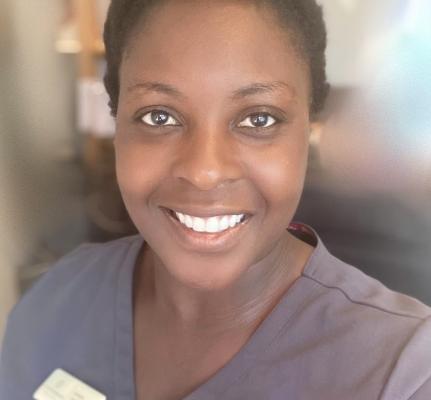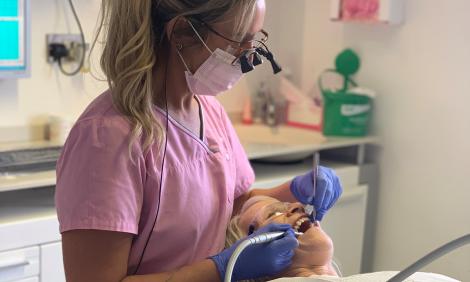Dental hygienist
Dental hygienists are an important part of the dental team, preventing dental problems in adults and children.
Working life
You'll help children and adults look after their teeth and gums. Sometimes you might be working on a one-to-one basis while on occasion you'll work with groups of people.
You'll carry out procedures such as:
- scaling teeth (at times under local anaesthetic)
- polishing teeth
- applying topical fluoride and fissure sealants
You are likely to work in general dental practices but there are job opportunities in hospitals and community dental services .
Your work as a dental hygienist will save teeth by preventing and treating gum disease, helping people get rid of associated problems like bad breath. The dentist will usually advise you and help direct your work, although it's now possible for hygienists and therapists who have extra training to set up their own practices or work independently in a dental practice so they can see patients without them seeing a dentist first.
In the community, you could work with people with a wide range of special or additional needs. If you are based in a hospital, you will help patients who may have had major surgery or complicated orthodontic treatment or have particular medical conditions. The hospital patients you see may be very ill, apprehensive or unsure after life-changing surgery.
Jessica Gardham
Student dental hygienist
Read Jessica's storyI’d like to inspire others who are over the age of 30 to retrain. I am 41 and about to start my career as a dental hygienist so it can be done!

Entry requirements, skills and interests
You'll need five GCSE subjects graded 4-7 or A-C, plus two or three A levels (depending on the university) or a recognised dental nursing qualification to get on to a dental hygiene course. Good people and communication skills are very important and as you might work in different settings, you'll need to enjoy a job with plenty of variety.
Training
To practise as a dental hygienist, you need to take a course approved by the General Dental Council (GDC) and then need to register with the GDC.
Subjects studied include:
- anatomy and physiology
- preventive dentistry
- dental health education
- dental pathology
- the management and care of patients
Several dental schools offer courses combining dental hygiene and dental therapy.
If you are studying a dental hygiene course at level 5 or 6 then you may be eligible for at least £5,000 a year towards your studies while at university. Your personal circumstances may mean you could receive more. And the good news? You'll never have to pay it back. Find out more.
Career development
With experience, you can progress to become a practice manager, train other dental hygienists or develop further skills such as sedation or tooth whitening. You could also work as an orthodontic therapist.
Pay and benefits
Dental hygienists may be self-employed or employed directly by a dental practice so your working hours and pay will vary but some evening or weekend work may be required.
If you work for the the NHS in a hospital or community clinic, your starting salary might be at bands 5 or 6 of the Agenda for Change pay scale. You'll typically work 37.5 hours a week.
Displaying 1 - 5 of 26 matches
-
Dental Therapy and Dental Hygiene
Cardiff University
View courseOpens in a new window
- Qualification
- Bachelor of Science (with Honours) - BSc (Hons)
- Study mode
- Full-time
- Duration of the course
- 3 Years
- Leading to a career in
- Dental hygiene or therapy
- Contact details
- [email protected] 029 2087 9999
- Region
- Wales
- Admissions address
- 30-36 Newport Road
Cardiff
CF24 0DE
United Kingdom
-
Dental Hygiene and Dental Therapy
University of Portsmouth
View courseOpens in a new window
- Qualification
- Bachelor of Science (with Honours) - BSc (Hons)
- Study mode
- Full-time
- Duration of the course
- 3 Years
- Leading to a career in
- Dental hygiene or therapy
- Contact details
- [email protected] 023 9284 5566
- Region
- South East
- Admissions address
- University House
Winston Churchill Avenue
Portsmouth
PO1 2UP
England
-
Oral Health Science
University of Essex
View courseOpens in a new window
- Qualification
- Foundation Degree in Science - FdSc
- Study mode
- Full-time
- Duration of the course
- 2 Years
- Leading to a career in
- Dental hygiene or therapy
- Contact details
- [email protected] 01206 873666
- Region
- East of England
- Admissions address
- University of Essex
Wivenhoe Park
Colchester
CO4 3SQ
England
-
Dental Hygiene
University of Portsmouth
View courseOpens in a new window
- Qualification
- Bachelor of Science (with Honours) - BSc (Hons)
- Study mode
- Full-time
- Duration of the course
- 3 Years
- Leading to a career in
- Dental hygiene or therapy
- Contact details
- [email protected] 023 9284 5566
- Region
- South East
- Admissions address
- University House
Winston Churchill Avenue
Portsmouth
PO1 2UP
England
-
Dental Hygiene
Cardiff University
View courseOpens in a new window
- Qualification
- Diploma of Higher Education - DipHE
- Study mode
- Full-time
- Duration of the course
- 2 Years
- Leading to a career in
- Dental hygiene or therapy
- Contact details
- [email protected] 029 2087 9999
- Region
- Wales
- Admissions address
- 30-36 Newport Road
Cardiff
CF24 0DE
United Kingdom
For more NHS vacancies, visit NHS Jobs.





